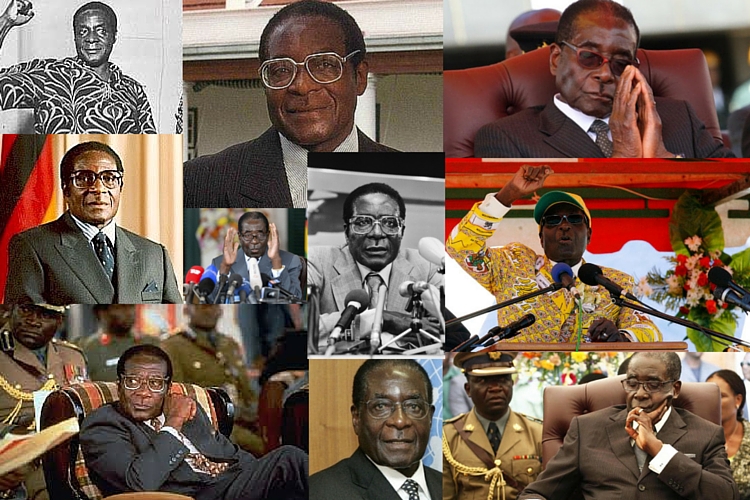The Early Years
 On 21 February1924, Robert Gabriel Mugabe was born at Kutama Catholic Mission in Zvimba Communal land is in Mashonaland 80km from Harare. He belongs to the Shona tribe and speaks the Zezuru dialect. He was the third son; his two older siblings Michael and Raphael died in their teens of unexplained causes. Mugabe’s other siblings included: Donato, Sabina, half-sister Gladys and half-brother Albert.
On 21 February1924, Robert Gabriel Mugabe was born at Kutama Catholic Mission in Zvimba Communal land is in Mashonaland 80km from Harare. He belongs to the Shona tribe and speaks the Zezuru dialect. He was the third son; his two older siblings Michael and Raphael died in their teens of unexplained causes. Mugabe’s other siblings included: Donato, Sabina, half-sister Gladys and half-brother Albert.
A little known fact about Mugabe is that he was named after his father Gabriel. Gabriel Mugabe abandoned his wife Bona and family when Mugabe was a tender 10 years old boy growing up in colonial Zimbabwe. As a result of Mugabe’s father’s abandonment he developed wrath as do most boys whose fathers ditch their families. Mugabe grows up without a father and his identity is shaped by his mother who is a strong influence in his life. Bona Mugabe applauded her son when he excelled in his studies and he loved the applause that came from it. He developed his identity in the applause of his mother.
The circumstances surrounding his early formidable years are sketchy, more myth than reality. Robert Mugabe even in his younger days was conscious about image. He was often a loner and liked his own company; many say that he was highly introspective though some of his actions do not reflect this characteristic. It is reported that Mugabe in the absence of his father was bullied by other boys in the village which caused him to deal with affectation in order to cope with the circumstances that he found himself in. In his mind he always wanted to prove to them that he wasn’t the wimpy kid that they picked on but that he was in fact somebody. So Mugabe developed a persona which people applauded him for and because he was praised for his education he wanted the applause to continue and it is in this applause that he derived his identity.
The death of his siblings must have taken a huge toll on the whole Mugabe family and especially on Mugabe as a child. This explains why Mugabe takes anyone leaving his party personally. He fears being abandoned by the people who are closest to him and that one day he may never get the applause of the people. This also explains why the talk regarding succession hurt him the most because he feels as though people are saying they are ready to leave him. Psychologists may describe these as abandonment issues.
Mugabe’s parents were poor peasants who lived on the communal land. The land owned by African peasants in those days was the one devoid of nutrients, sandy and unsuitable for agriculture. This was a result of Land Acts passed by the colonial government such as the Rudd Concession; Land Tenure Act & Land Apportionment Acts.
In 1945, Mugabe graduated from St Francis Xavier teaching College. Thereafter, he enrolled at Fort Hare University, the only institution for Higher learning for blacks in South Africa and was the Harvard, Yale and Oxford for black students coming from Southern, Central and Eastern Africa. Mugabe was awarded an opportunity to study at the University in 1949. Mugabe still funds scholarships to Fort Hare on condition that the students do not engage in activism.
It is believed that “Matibili” abandoned the family and Mugabe was raised by a single mother who took him to be educated by the Franciscan brothers at Kutama College where he acquired his Catholic faith. At this time during colonialism, Churches were the only ones that educated natives. He was an exceptional scholar and was one of the first Africans to study English at Fort Hare University in South Africa at a time when there were very few Africans to go to tertiary institutions let alone universities. His education at a time when the majority of the people were illiterate gave him access to positions of leadership. The colonial education system limited the number of Africans who attained higher education through a system of quotas.
Mugabe worked at Chalimbana Teacher Training College, in Zambia from 1955–1958. Thereafter he taught at Apowa Secondary School at Takoradi, in the Western region of Ghana after completing his local certification at Achimota School (1958–1960). While in Ghana he met his first wife Sarah Hayfron affectionately known as “Sally” whom he married in 1961. Their only child Nhamodzenyika died after only a few weeks of being in the world from cerebral malaria. Ghana was a newly independent country at the time so when Mugabe met Kwame Nkrumah he was inspired to make changes in his native Zimbabwe and remove the shackles that were binding his people just as Nkrumah had done in Ghana. He was immediately attracted to the Pan Africanist Movement.
In Zimbabwe known then as Southern Rhodesia independence would come 20 years later, after much fighting and turmoil. Mugabe also earned a Bachelor of Administration and Bachelor of Education from the University of South Africa and a Bachelor of Science, Bachelor of Laws, Master of Science, and Master of Laws, all from the University of London External Programme. The two Law degrees were earned while he was in prison, the Master of Science degree earned during his premiership of Zimbabwe.




